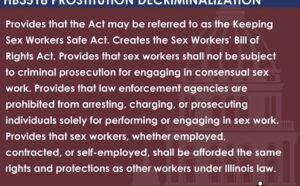In December 2013, the Supreme Court of Canada ruled that the criminal code on sex work violates the constitution because it prohibits sex workers from taking measures to protect their personal security. The government has one year to draft new legislation, and recently held a public consultation on ‘Prostitution-Related Offences.’ Among the many personal security issues at stake for sex workers, which the government must consider in drafting new legislation, is the risk of HIV infection. As the Global Commission on HIV/AIDS and the Law points out, legal environments that deny human rights to security, also provide fertile ground for the expansion of HIV/AIDS.
While there isn’t reliable data on HIV/AIDS prevalence among sex workers in Canada — due to the difficulty of collecting information on a group that works underground and rarely declares their profession when accessing health services — according to UNAIDS, female sex workers worldwide are 13.5 times more like to be infected with HIV than their peers. Risk of HIV is related to sex workers’ ability to use condoms, negotiate safer sex, protect themselves from violence and access health care for testing and treatment.
Julie Grant, from Sex Professionals of Canada, notes that sex workers usually practice safer sex than the general population because staying healthy is essential to their business. However, sex workers’ ability to protect themselves, and clients, from HIV depends on their ability to have control over working conditions, and access health care and legal protection.
Sandra Ka Hu Chu, at the Canadian HIV/AIDS Legal Network, explains, “We have seen so much evidence that the control sex workers have over their working conditions, including protecting themselves from HIV, has a huge impact in driving this wedge between sex workers and health care. Health care workers aren’t able to reach sex workers and sex workers are deterred from health care because of fear of criminalization, stigma and incarceration.”
There are three basic approaches to sex worker legislation: decriminalization, the ‘Nordic’ model and prohibition. The model the Canadian HIV/AIDS Legal Network and most sex worker rights organizations advocate for is decriminalization.
Decriminalization allows sex workers to organize collectively, which has been proven to reduce HIV prevalence in countries such as India. Decriminalization also enables sex workers to work inside (as opposed to on the street or other precarious locations), where it is easier to ensure condoms are available and to refuse high-risk clients. Recognizing such public health benefits, the World Health Organization and UNAIDS both recommend decriminalizing sex work.
New Zealand decriminalized sex work in 2003. Government evaluations since have found that because sex work was brought under health and safety legislation, workers were able to assert their rights to demand condom use and were more likely to access health care. Grant explains, “The more open you can be about your health the better it is. The more legal something is the morel likely you are to be honest about it. So in that way the health of the community can be impacted.”
The ‘Nordic’ model of sex work legislation, implemented in Sweden, Norway and Iceland, does not criminalize selling sex, but does criminalize buying it and benefiting from the income of sex workers. Because third parties are prohibited from benefiting from sex work income, workers cannot employ bodyguards to protect themselves from unprotected and violent sex. According to Ka Hon Chu, the Nordic model does not decrease risk of HIV infection, “It might seem like you aren’t criminalizing sex workers, but you are pushing them to the margins to work. And it has the same outcomes: inability to screen [high risk clients], displacement from health and social services.”







[…] Julie Grant, from Sex Professionals …read more […]
[…] To help or to hinder? Sex work legislation and HIV prevention […]
The effing “Nordic Model” IS prohibition and brings with it all the attendant risks, including the spread of STDs both among sex workers and the general public.